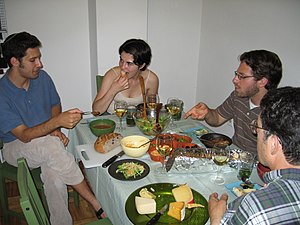
A lot of Americans are puzzled when they look closely at the Jewish community, because sometimes it looks like religion isn’t very important to Jews. Many Jews only go to synagogue at the High Holy Days. Many more never go to synagogue at all. We have lots of “secular Jewish” organizations that do social justice work or poor relief or jewish community service of some kind. Some Jews refer to themselves as cultural Jews. (When was the last time you heard someone refer to themselves as a cultural Christian?)
It gets even more confusing when you look at world Jewry, because Judaism encompasses a number of ethnicities. Here in the US we are most familiar with Ashkenazi culture (think Fiddler on the Roof.) Ashkenazi means “Jews from Eastern Europe.” However, the first Jewish Americans were Sephardic, meaning that their ancestors had at one time been part of the Jewish culture of Spain. There are also Mizrahi Jews, Jews of the Middle East, who have rich and interesting subcultures such as Persian Jews, Moroccan Jews, Egyptian Jews, Yemenite Jews, and so on. Most of the Mizrahi communities today survive in Israel or the US, because they were evicted from their home countries in the 20th century, but the music, the food, and the liturgy survive and are distinct from anything else in the Jewish world.
Judaism is a religion, but it is more than that. It includes religion, worldview, lifestyle, a calendar and a sense of connection to the other Jews of the world. It is rooted in a Teaching, which we call Torah, and the language of that Teaching, Hebrew. Jews disagree about the pronunciation of Hebrew or about the interpretation of Torah but even the most a-religious Jew is linked to other Jews by those two things. Our concepts of justice, of law, and our priorities of life find their sources in Torah. Our ways of measuring time, of eating and drinking, of welcoming children and mourning the dead are rooted in Torah. We do not agree on interpretation, but that is interpretation, not the source itself.
Rabbi Mordechai Kaplan said it best when he called Judaism a civilization. It defies limitations like “religion” or “ethnicity;” it is one of the oldest civilizations on earth. That is why, when the sage Hillel was asked to sum it up while standing on one foot (in the 1st century!) he concluded his precís with the words “Go and study,” and why the sage Ben Bag Bag said, “Turn it and turn it, for everything is in it.”
So, go and study. Turn the scroll and learn, but resist any temptation to confine Judaism to a tidy package. There’s nothing tidy about it.
Image: ![]()
![]()
![]() Some rights reserved by Government Press Office (GPO)
Some rights reserved by Government Press Office (GPO)









